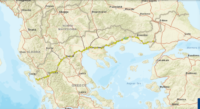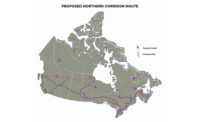French toll road operators are gearing up for a battle with their government over a proposed tax on sales to be applied starting next year. The government expects to raise around $630 million in its first year to help fund a big investment plan for railroads and other carbon-cutting transportation infrastructure.
Following a report by the Infrastructure Orientation Council early this year, the government announced transportation plans, including a $106-billion investment in railroad infrastructure by 2040.
"While transport is responsible for 30% of our greenhouse gas emissions, their decarbonization is one of our first challenges to overcome," said Prime Minister Elisabeth Borne. Achieving the goal of cutting greenhouse gas emissions by 55% by 2030 and reaching carbon neutrality by 2050 "requires strong, determined action in all areas," she added.
The new tax, appearing in draft finance legislation for next year, covers mainly major toll roads as well as some airports. It would apply to earnings from each long-distance infrastructure entity exceeding $127 million at a rate of 4.6%.
Giant VINCI Group, which owns several affected transportation infrastructure businesses, estimates the tax would cost it $275 million in the first year.
The proposed tax is "contrary both to the spirit and to the letter of concession contracts, particularly those signed between the state as grantor and the motorway concession companies," claimed the company in a statement. VINCI says it will "use all available avenues of appeal."
Another big toll road operator, Eiffage Group, also intends to "use all appropriate means and all appropriate avenues to assert its rights, particularly with regard to respect of the contract."
The tax would have cut company profits by $124 million had it applied last year, it estimates. Eiffage controls two toll road companies operating more than 1,400 miles of French highways serving some 20 million users a year.





Post a comment to this article
Report Abusive Comment